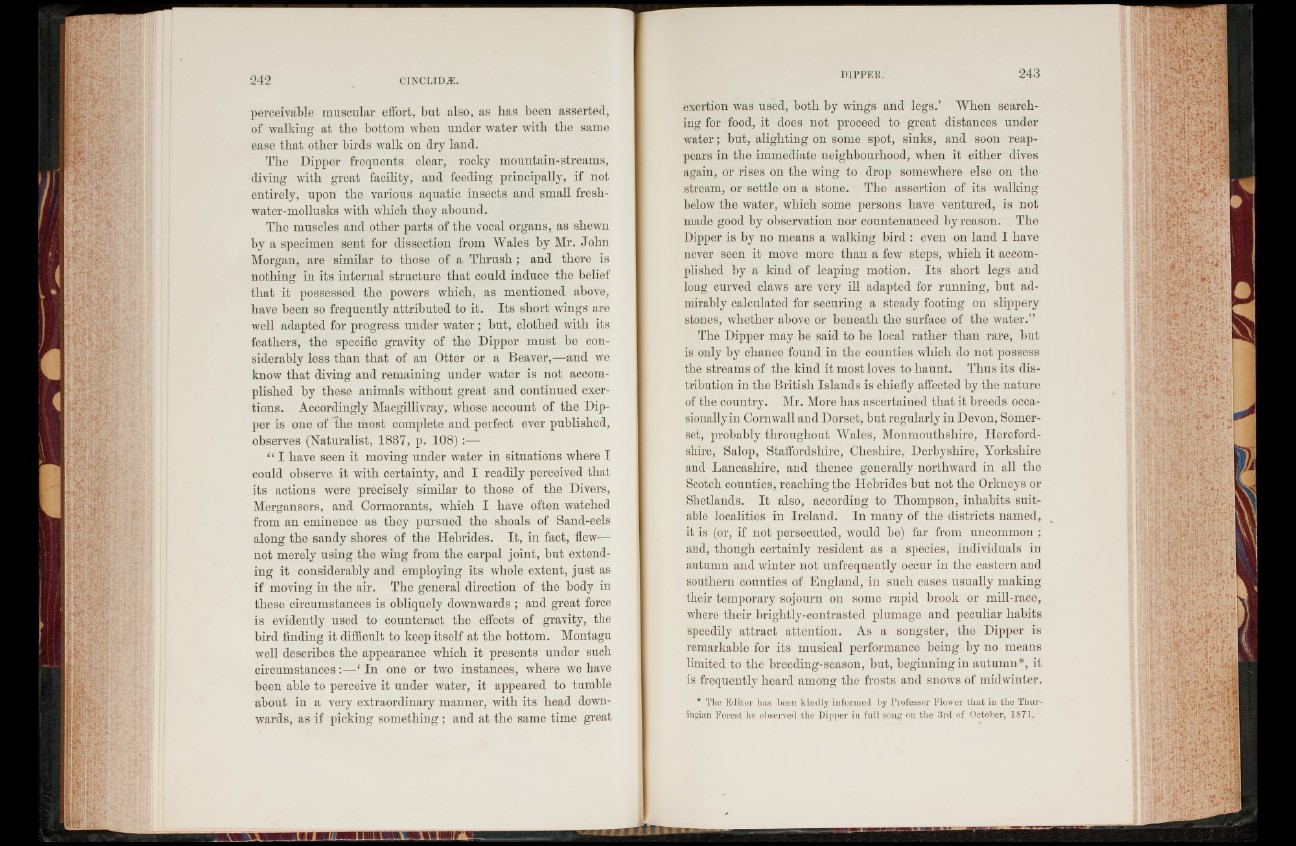
perceivable muscular effort, but also, as has been asserted,
of walking at the bottom when under water with the same
ease that other birds walk on dry land.
The Dipper frequents clear, rocky mountain-streams,
diving with great facility, and feeding principally, if not
entirely, upon the various aquatic insects and small fresh-
water-mollusks with which they abound.
The muscles and other parts of the vocal organs, as shewn
by a specimen sent for dissection from Wales by Mr. John
Morgan, are similar to those of a T h ru sh ; and there is
nothing in its internal structure that could induce the belief
that it possessed the powers which, as mentioned above,
have been so frequently attributed to it. Its short wings are
well adapted for progress under water; but, clothed with its
feathers, the specific gravity of the Dipper must be considerably
less than that of an Otter or a Beaver,—and we
know that diving and remaining under water is not accomplished
by these animals without great and continued exertions.
Accordingly Macgillivray, whose account of the Dipper
is one of the most complete and perfect ever published,
observes (Naturalist, 1837, p. 108) :—
“ I have seen it moving under water in situations where I
could observe it with certainty, and I readily perceived that
its actions were precisely similar to those of the Divers,
Mergansers, and Cormorants, which I have often watched
from an eminence as they pursued the slioals of Sand-eels
along the sandy shores of the Hebrides. It, in fact, flew—
not merely using the wing from the carpal joint, but extending
it considerably and employing its whole extent, just as
if moving in the air. The general direction of the body in
these circumstances is obliquely downwards; and great force
is evidently used to counteract the effects of gravity, the
bird finding it difficult to keep itself at the bottom. Montagu
well describes the appearance which it presents under such
circumstances:—-* In one or two instances, where we have
been able to perceive it under water, it appeared to tumble
about in a very extraordinary manner, with its head downwards,
as if picking something ; and at the same time great
exertion was used, both by wings and legs.’ When searching
for food, it does not proceed to great distances under
water; but, alighting on some spot, sinks, and soon reappears
in the immediate neighbourhood, when it either dives
again, or rises on the wing to drop somewhere else on the
stream, or settle on a stone. The assertion of its walking
below the water, which some persons have ventured, is not
made good by observation nor countenanced by reason. The
Dipper is by no means a walking bird : even on land I have
never seen it move more than a few steps, which it accomplished
by a kind of leaping motion. Its short legs and
long curved claws are very ill adapted for running, but admirably
calculated for securing a steady footing on slippery
stones, whether above or beneath the surface of the water.”
The Dipper may be said to be local rather than rare, but
is only by chance found in the counties which do not possess
the streams of the kind it most loves to haunt. Thus its distribution
in the British Islands is chiefly affected by the nature
of the country. Mr. More has ascertained that it breeds occasionally
in Cornwall and Dorset, but regularly in Devon, Somerset,
probably throughout Wales, Monmouthshire, Herefordshire,
Salop, Staffordshire, Cheshire, Derbyshire, Yorkshire
and Lancashire, and thence generally northward in all the
Scotch counties, reaching the Hebrides but not the Orkneys or
Shetlands. I t also, according to Thompson, inhabits suitable
localities in Ireland. In many of the districts named,
it is (or, if not persecuted, would be) far from uncommon ;
and, though certainly resident as a species, individuals in
autumn and winter not unfrequently occur in the eastern and
southern counties of England, in such cases usually making
their temporary sojourn on some rapid brook or mill-race,
where their brightly-contrasted plumage and peculiar habits
speedily attract attention. As a songster, the Dipper is
remarkable for its musical performance being by no means
limited to the breeding-season, but, beginning in autumn*, it
is frequently heard among the frosts and snows of midwinter.
* The Editor has been kindly informed by Professor Flower that in the Thur-
ingian Forest he observed the Dipper in full song on the 3rd of October, 1871.